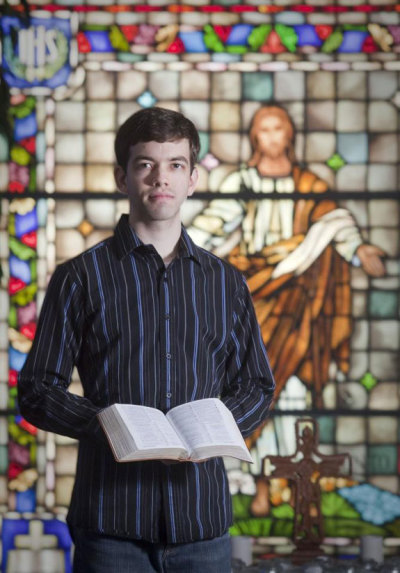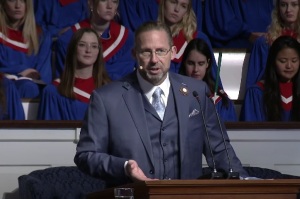Matthew Vines Says Most Christians Are Wrong: Homosexuality Is Not a Sin
Editor's Note: This is the first part in a three-part series that will feature both sides of the debate on the Bible and homosexuality. Following Matthew Vines' interview will be responses from evangelical theologians, and finally, guest contributions from Christians who have chosen not to engage in homosexuality and those who don't believe a gay lifestyle conflicts with the Bible. Read Part 2: "Theologians Find Vines' 'Homosexuality Is Not a Sin' Thesis Not Persuasive."

Matthew Vines is a 22-year-old gay Christian who believes being gay is not a sin. He came to that conclusion after two years of studying Scripture and the works of dozens of biblical scholars. The Harvard University student, currently on leave of absence, is now trying to win over fellow believers not just with an emotional testimony but with what he is presenting as biblically solid arguments.
"There is no contradiction between being Christian and being gay," he told BBC.
His arguments – mainly against six Bible passages that are commonly used by Christians to condemn homosexuality – are gaining popularity as evidenced by his YouTube views. In six months, an over hour-long video of Vines meticulously challenging what he calls the traditional interpretation of Scripture has garnered nearly 400,000 views.
In an interview with The Christian Post, Vines made it clear that he believes that Christians who believe homosexuality is a sin are wrong. "Loving, same-sex relationships" are not addressed in the Bible, let alone condemned, he argued.
Vines distinguishes between lustful, casual homosexual behavior and loving, "natural" same-sex relationships, arguing that it is only the former behavior that the Bible speaks against.
The Wichita, Kan., resident has already changed some Christians' stance on homosexuality, including that of his devout Christian father, whom he came out to just a couple years ago.
Vines has stated that he was raised in a loving, Christian home – never molested or abused – and a church community that holds the traditional view of homosexuality. He expressed optimism that the acceptance of gay Christians will soon prevail.
Below is a transcript of the interview.
CP: What were the scholarly works or people you talked to that led you to develop your view on Scripture and homosexuality?
Vines: I became more interested in understanding the issue when I came to meet gay people for the first time in high school because when the issue is just an abstraction, then it is much easier not to talk about it very much. But when you have gay people in your life that you care about, it makes you want to consider things more deeply.
So once then I decided to really study the scriptural issues in depth, what I did was, there are dozens of works of scholarship out there now on this subject from all perspectives, and so I started buying different books that seemed to be regularly referenced. The goal was to read books on both sides in order to try and understand those perspectives, to get one argument and then to see all counter-arguments to it back and forth. I now own several dozen books on the subject, I've read many more than that as well, basically just reading a lot of different works of scholarship on the subject, and trying to get as wide of a range of views as possible so that I could feel that my views were as well-informed as they can be.
CP: Are there any specific works that inspired you more than others?
Vines: I wouldn't say that there is any one book that in of itself that was transformative for me. There are some books that I found to be particularly well thought-out. There is a book called Homoeroticism in the Biblical World by Martti Nissinen. He is a Danish scholar, and it is a very well-researched book. But on the whole, what was more persuasive for me was less a single work than the collective experience of studying a lot of different perspectives, and also not just studying on my own, but having many different conversations with people, with other Christians who have very different views on the subject. So having many different conversations with fellow Christians about the issue, and also many different conversations with gay people about the issue, I feel that that was what was most influential to me – this amalgamation of experiences and studies rather than any other one work or experience.
CP: In the video, you give an explanation about the scriptures that address homosexuality and how you believe they have been misunderstood by a lot of mainstream churches . But how did this "misconception" arise and how has it survived for hundreds of years?
Vines: That gets a little bit into some murky historical terrain, in terms of going back to the first millennium of Christian history, which is somewhat difficult to recover with a lot of confidence on this issue. You can find isolated ecclesiastical opinions from the 4th century or the 7th century. But in terms of really understanding how widespread and uniform church practice at a lay-level really was in the first millennium of church history, it's still fairly unclear how all of that played out. But by the 13th century, opposition to same-sex relationships became part of the understanding of natural law theory. This became an official part of the Catholic doctrine at least from the 13th century on. That's the point at which we have clear institutional writings and teaching to that effect.
I am not in a place where I can confidently state, and I'm not sure anyone is, that this is exactly how the misconception arose. However, what is instructive is to look at parallel issues because there are several major issues in biblical interpretations where the vast majority of Christians believes that the correct understanding of the Bible is not the historic, traditional understanding of the Bible.
Take slavery for instance. We reject it today, and we also believe that the passages that were used to support it – well, we weren't really looking at their appropriate historical context and so we were misusing them for a very long time to allow for slavery. So how exactly did that happen? How did that particular misconception arise? I don't think that there is any grand conspiracy that brought these things about.
In general, people and Christians are shaped in the culture that we live in. A misunderstanding about sexual orientation, because very few people percentage-wise are gay, it is very easy for people who are heterosexual to project their own experiences onto those of everyone else's; and then to end up marginalizing and excluding gay people because they don't really understand that they are not simply misbehaving by acting in a different way and by pursuing same-sex relationships, but they are fundamentally different, have a different sexual orientation. And what they are pursuing and trying to find for themselves is really the same thing as straight Christians. It just looks different because they are gay.
This type of misconception can arise because gay people are few in number. So when there is a lot of hostility toward them, it is extremely difficult for people on a broad level to understand them, and people are more likely to read into Scripture a worldly prejudice. And I do believe that homophobia is fundamentally of the world, and then therefore the church is tainted by accepting something that is worldly rather than godly. And I think that often times it is difficult for all of us to distinguish between what is of the world and what isn't, and in this case I think that once people have absorbed a societal prejudice, then they are more likely to read it back into the Bible, rather than allowing the Bible itself to direct the thinking on the subject.





























